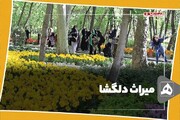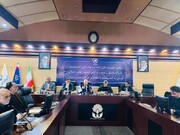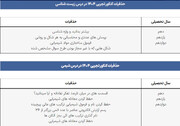Law on Dissemination of and Free Access to Information
Enacted in 7 July 2009
Chapter One : Definitions and Principles
Sub-chapter One : Definitions
Article 1 – In this law, the following words and expressions are used with the meanings specified:
a – Information: any kind of data mentioned in documents, stored in software or recorded otherwise
b – Personal Information: information pertaining to individuals such as name, surname, home and work addresses, the situation of family life, personal habits, physical problems, bank account numbers and passwords.
c – public Information: non-personal information such as regulations and bylaws, national and official statistics and figures, administrative documents and communications which are not under of the exceptions to Chapter 4 of this law.
d – Public Institutions: all state organizations and institutions in the broad sense of the word, including all of their parts and constituents which are mentioned in the laws of the Islamic Republic of Iran.
e – Private Institutions: in this law, a private institution includes any for-profit and non-for-profit institutions, exclusive of public institutions.
Sub-chapter Two: Freedom of Information
Article 2 – Any Iranian citizen is entitled to have access to public information, unless prohibited by law. Any use of public information or its dissemination shall be subject to laws and regulations.
Article 3 – Every person has the right to prevent the release and dissemination of the information which has been provided by him/her but manipulated before release, provided that such information has not been provided on the order of other person, in which case the matter shall be subject to an agreement between them.
Article 4 – It shall be forbidden to compel those who provide and disseminate information to disclose the sources of their information, unless ordered by competent judicial authorities, but this shall not negate the liability of those providing and disseminating information.
Sub-chapter Three : The Right of Access to Information
Article 5 – Public institutions are obliged to provide people with the information which is the subject of this law in the shortest time possible and without discrimination.
Note – The information which brings rights and obligations for people should be released through public announcements and mass media as well.
Chapter Two : Procedure of Access to Information
Sub-chapter One : Request for Access to Information, and Deadline for Replying to the Request
Article 6 – Requests for access to private information shall only be accepted from natural persons to whom the information is related, or from their legal representatives.
Article 7 – A public institution is not authorized to ask applicants requesting information to provide a reason or justification for their request.
Article 8 – A public or private institution should reply to the request for information as soon as possible, and the time to reply should not exceed maximum ten days after the request is received. In six months’ time from the date this law is ratified, the bylaw on the enforcement of this article shall be proposed by the Commission on Dissemination of and Free Access to Information and approved by the Council of Ministers.
Sub-chapter Two : How to Reply to Requests
Article 9 – Replies by private institutions to the requests for access to information should be in writing or electronic.
Chapter Three : Promotion of Transparency
Sub-chapter One: Obligation to Release Information
Article 10 – Each public institution for the public good and in line with citizens rights, , should at least on an annual basis, publish public information except classified ones, including its performance report and balance sheet, using computer facilities, and if possible, in the form of a guidebook, which could contain the following information. Citizens may receive the guidebook after paying the cost :
a – Objectives, duties, strategies, policies and there structures;
b – Methods and stages of all the services offered directly by the institution to members of the society;
c – Mechanisms through which citizens can complain about the institution’s decisions and actions;
d – Different types and forms of the information kept at that institution, and the regulations on how to access them;
e - The powers and duties of its senior officials;
f –All the mechanisms or bylaws by which natural and legal persons as well as non-governmental organizations may contribute to the fulfillment of the institution’s duties or may be effective otherwise.
Note – As regards the institutions which are under the direct supervision of the Supreme Leader, this Article shall be implemented except when there is opposition by the Supreme Leader.
Article 11 – Enactments and decisions which involve public rights or duties cannot be classified as state secrets, and should be published.
Sub-chapter Two: –The Information unit’s Report to the Commission on Dissemination of and Free Access to Information
Article 12 – Public institutions’ information units are obliged to present to the Commission on Dissemination of and Free Access to Information annual reports on the institution’s activities geared to the implementation of this law.
Chapter Four : Exceptions in Access to Information
Sub-chapter One : State Secrets
Article 13 – In the event that the applicant’s request is related to classified documents and information (state secrets), public institutions should withhold such information. Access to classified information is subject to specific laws and regulations.
Sub-chapter Two : Protection of Privacy
Article 14 – If the requested information pertains to privacy of persons, or is regarded as information obtained through the violation of privacy, the request should be rejected.
Article 15 – If accepting the request leads to the illegal disclosure of personal information of the third person, the institutions subject to this law should withhold the requested information unless:
A – The third party has given his/her consent, explicitly and in writing, to the disclosure of information about him/her.
B – The applicant is the third party’s legal guardian or lawyer, and acting within his/her powers.
C – The applicant is a public institution, and the requested information is, based on the law, directly related to its powers and duties.
Sub-chapter Three : Protection of Health and Trade Information
Article 16 – If, based on legal evidences, it is proven to the institutions subject to this law that providing the requested information will jeopardize individuals life or health or inflict material or trade losses upon them, the institutions should withhold the information.
Sub-chapter Four : Miscellaneous Cases
Article 17 – The institutions subject to this law are obliged to withhold information in cases where the requested information shall harm or disrupt the following:
a – Public peace and security;
b – Prevention or investigation of crimes or prosecution of criminals;
c – Auditing and collecting taxes or legal fees;
d – Monitoring immigration into the country.
Note 1 – The provisions of Articles 13–17 shall not apply to information regarding the existence or emergence of environmental risks and threats to public health.
Note 2 – The subject of Articles 15 and 16 shall not apply to information which might lead to defamation, outrage public decency or promote obscene acts.
Chapter Five : The Commission on Dissemination of and Free Access to Information
Sub-chapter One : Formation of the Commission
Article 18 – In order to support freedom of information and public access to the information available at public and private institutions which offer public services, the Commission on Dissemination of and Free Access to Information shall be established upon order by the President with the following lineup in order to draw up executive plans required for information dissemination, monitor the proper implementation of the plans, settle the disputes on how to provide information by standard practice making , promote the culture of freedom of information and offer guidelines as well as consultative opinions:
a – The Minister of Culture and Islamic Guidance (head of the commission)
b –The Minister of Communications and Information Technology or the relevant deputy
c – The Minister of Intelligence or the relevant deputy
d – The Minister of Defense and Logistics of the Armed Forces or the relevant deputy
e – The Head of the country’s Management and Planning Organization or the relevant deputy
f –The Head of the Administrative Court of Justice
g – The Chairman of Parliament’s Cultural Commission
h – The Secretary of the country’s Supreme Information Technology Council
Note 1 – The secretariat of the abovesaid commission shall be established at the Ministry of Culture and Islamic Guidance. Internal Rules as well as the responsibilities of the secretariat shall be proposed by the abovementioned commission and approved by the Council of Ministers.
Note 2 – The decisions made by the Commission on Dissemination of and Free Access to Information shall be binding after the president’s approval.
Sub-chapter Two : The Commission’s Report
Article 20 – The commission should present to the Parliament and the President an annual report on its activities and the observance of this law by the institutions subject to this law.
Chapter Six : Civil and Criminal Liabilities
Article 21 – Any natural or legal person whose material and non –material interests have been harmed due to the release of false information about him/her is entitled to deny the said information or give explanations on the information and seek remedies in accordance with the general rules of the civil liability.
Note – In the event of dissemination of true information in violation of the provisions of this law, natural and legal persons have the right to demand damages in accordance with the general rules of the civil liability.
Article 22 –Deliberate commission of the following acts shall be regarded as an offense, and the perpetrator shall be sentenced to the payment of cash fines from Rls. 300 thousand (300,000) to Rls. 100 million (100,000,000) depending on the seriousness of the act, the number of times the offense was committed and the condition of the perpetrator.
a – Prevention of access to information in violation of the provisions stipulated in this law;
b – Commission or non-commission of any act, which may hinder the discharging of responsibilities of the Commission on Dissemination of and Free Access to Information, or impede public institutions’ task of disseminating information in violation of the provisions of this law;
c– partial or total erasure of information without having the legal authority to do so;
d –Violation of the provisions of this law as regards the deadlines stipulated.
If any of the abovementioned offenses carry heavier punishments in other laws, the same shall be meted out.
Article 23 – In maximum three months’ time from the date this law is passed, the bylaw on the enforcement of this law shall be drawn up by the Ministry of Culture and Islamic Guidance in cooperation with relevant institutions, and approved by the council of Ministers.














نظر شما